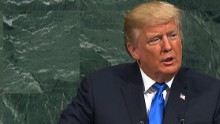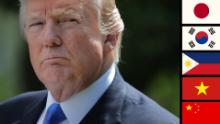Trump puts N. Korea on state sponsor of terror list
begin quote from:
Democrats concerned Trump too 'unstable' to handle nukes
Democrats concerned Trump too 'unstable' to be trusted with nukes
Story highlights
- The panel warned against legislative changes to rein in the President's authority to exercise nuclear authority
- Republican members did seek assurance that there are legal and strategic oversight measures in place
Washington (CNN)Congressional lawmakers raised concerns about President Donald Trump's
ability to use nuclear weapons during a hearing Capitol Hill Tuesday
amid bipartisan anxiety over launch process procedures and indications
that the administration has considered the option of a first strike on
North Korea.
Members
of the Senate foreign affairs committee called into question a
decades-old presidential authority to deploy nuclear weapons in what was
the first congressional hearing on nuclear authorization in decades.
"We
are concerned that the President of the United States is so unstable,
is so volatile, has a decision-making process that is so quixotic that
he might order a nuclear weapons strike that is wildly out of step with
US national security interests," said Sen. Chris Murphy, D-Connecticut.
Sen.
Ed Markey, a Democrat from Massachusetts, echoed those concerns: "Many
Americans fear that the President's words could turn into nuclear
reality."
Republican
members of the committee were less blunt in their criticism of Trump's
judgment but did seek assurance that there are legal and strategic
oversight measures in place to prevent the rash use of nuclear weapons.
Ultimately, the panel warned against legislative changes to rein in the President's authority to exercise nuclear authority.
"I
think hard cases make bad law, and I think if we were to change the
decision-making process in some way because of a distrust of this
President, I think that would be an unfortunate precedent," said Brian
Mckeon, who previously served as Principal Deputy Under Secretary of
Defense for Policy during the Obama administration.
Retired
Air Force Gen. Robert Kehler, who previously served as the commander of
US Strategic Command under President Barack Obama, explained that there
are layers of safeguards within the current system designed to ensure
any order is both legal and proportionally appropriate.
"US
nuclear forces operate under strict civilian control. Only the
President of the United States can order the employment of US nuclear
weapons," Kehler said at the hearing.
"This
is a system controlled by human beings ... nothing happens
automatically," he said, adding that the US military does not blindly
follow orders and a presidential order to employ nuclear weapons must be
legal.
While the President
retains constitutional authority to order some military action, Kehler
explained that the nuclear decision process "includes assessment, review
and consultation between the President and key civilian and military
leaders, followed by transmission and implementation of any Presidential
decision by the forces themselves."
"If there is an illegal order presented to the military, the military is obligated to refuse to follow it," he said.
Dr.
Peter Feaver, a professor of public policy and political science at
Duke University, also highlighted the point that any nuclear launch
would be preceded by a review and consultation process.
"The
system is not a button that the President can accidentally lean on
against the desk and immediately cause missiles to fly as some people in
the public, I think, fear it would be," Feaver testified, adding that
the decision requires the President to work with military aides who are
attending him -- who have possession of the materials he needs -- and
personnel at all levels from top commanders all the way down to service
members working in the missile silo to carry out an order.
"The
President by himself cannot press a button and cause missiles to fly.
He can only give an authenticated order which others would follow and
then missiles would fly," he said.
The
administration has been trying to soothe concerns by arguing the
existing launch process that presidents have operated under for decades
has sufficient checks in place that would discourage Trump from taking
imprudent action. Trump himself has had multiple briefings on the
nuclear launch cycle and more conventional, non-nuclear alternatives.



























No comments:
Post a Comment